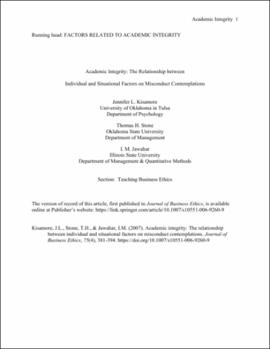| dc.contributor.author | Kisamore, Jennifer L. | |
| dc.contributor.author | Stone, Thomas H. | |
| dc.contributor.author | Jawahar, I.M. | |
| dc.date.accessioned | 2022-04-27T15:53:20Z | |
| dc.date.available | 2022-04-27T15:53:20Z | |
| dc.date.issued | 2007-03-22 | |
| dc.identifier.citation | Academic integrity: The relationship between individual and situational factors on misconduct contemplations. Journal of Business Ethics, 75(4), 381-394. https://doi.org/10.1007/s10551-006-9260-9 | en_US |
| dc.identifier.uri | https://hdl.handle.net/11244/335293 | |
| dc.description | The version of record of this article, first published in Journal of Business Ethics, is available online at Publisher’s website: https://link.springer.com/article/10.1007/s10551-006-9260-9 | en_US |
| dc.description.abstract | Recent, well-publicized scandals, involving unethical conduct have rekindled interest in academic misconduct. Prior studies of academic misconduct have focused exclusively on situational factors (e.g., integrity culture, honor codes), demographic variables or personality constructs. We contend that it is important to also examine how these classes of variables interact to influence perceptions of and intentions relating to academic misconduct. In a sample of business students, we examined how integrity culture interacts with Prudence and Adjustment to explain variance in estimated frequency of cheating, suspicions of cheating, considering cheating and reporting cheating. Age, integrity culture, and personality variables were significantly related to different criteria. Overall, personality variables explained the most unique variance in academic misconduct, and Adjustment interacted with integrity culture, such that integrity culture had more influence on intentions to cheat for less well adjusted individuals. Implications for practice are discussed and future research directions are offered. | en_US |
| dc.language | en | en_US |
| dc.subject | Academic Integrity | en_US |
| dc.subject | Academic Culture | en_US |
| dc.subject | Cheating | en_US |
| dc.subject | Misconduct | en_US |
| dc.subject | Personality | en_US |
| dc.title | Academic integrity: The relationship between individual and situational factors on misconduct contemplations | en_US |
| dc.type | Article | en_US |
| dc.description.peerreview | Yes | en_US |
| dc.identifier.doi | https://doi.org/10.1007/s10551-006-9260-9 | en_US |
| ou.group | Dodge Family College of Arts and Sciences::Department of Psychology | en_US |
